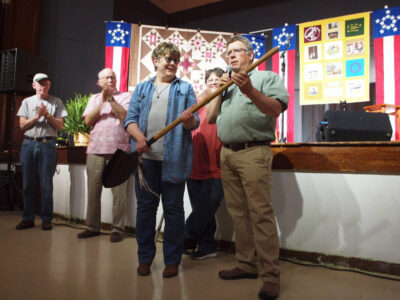A new line of nonfiction books from University Press aims to elevate authentic Midwestern stories, buck trends about ‘flyover country’

photo by: Bremen Keasey
University Press of Kansas building on KU's campus, 2502 Westbrooke Cir. Plainspoken books, a new line of non-fiction books that UPK announced this month, hopes to elevate Midwestern stories into a national conversation and buck stereotypes of the region.
As a lifelong Kansan, Alec Loganbill knows how interesting and unique the Midwest can be. But while working in publishing, he noticed that not everyone else sees it that way.
“(People believe) there is not much going on, it’s behind the times, and kind of a meme,” Loganbill said. “It’s flyover country.”
Loganbill said it’s disappointing that this huge swath of the country and its stories can be overlooked in the publishing field. And he hopes a new imprint of the University Press of Kansas can change things.
This month, University Press of Kansas announced the new nonfiction imprint led by Loganbill, called “Plainspoken Books,” which aims to amplify Midwestern voices and tell local stories that have national significance. It just released its first first book, “Whirlwind,” a memoir by television journalist and KU alumnus Bill Kurtis about how his time in Kansas helped him become an award-winning journalist.
Loganbill said the goal is to help shake off the perceptions of the region, bring recognition to Midwestern authors and tell stories that highlight the Midwest’s importance for a national audience.
Our goal is to publish exciting and authentic non-fiction stories from the Midwest,” Loganbill said. “(Stories) that people who live here would see themselves in and appreciate, but also readers all across the country.”

photo by: Contributed
Alec Loganbill, the editor of University Press of Kansas’s non-fiction imprint Plainspoken Books, hopes the project can tell authentic Midwestern stories that can make an impact.
While University Press of Kansas has published books that contribute to the understanding of Kansas, the Great Plains, and the Midwest since it was founded in 1946, traditionally it serves as the publishing house for the state’s six universities: Emporia State University, Fort Hays State University, Kansas State University, Pittsburg State University, the University of Kansas and Wichita State University.
Loganbill said when he joined University Press of Kansas, he was given the opportunity to “reimagine” what a regional list could look like. He first pitched the idea of Plainspoken Books to his bosses in October and was working behind the scenes to get books that could fit with his idea of a hub for Midwestern storytelling.
Part of the idea for Plainspoken Books is “place-based storytelling.” To Loganbill, that means not trying to give its books a “coastal sensibility.” Loganbill said that when stories from Midwestern authors get big nationally, they’re often published somewhere else — such as New York — and that means a story from a Midwestern or Great Plains locale could be changed significantly by a publisher who wanted the story to be something else. Loganbill said Plainspoken won’t use that kind of filtering process.
“We are trying to be a really authentic home for Midwestern authors and not have to translate their stories to get to us,” Loganbill said.
So far, Loganbill says the idea has worked. In the year or so before University Press of Kansas announced the new imprint, Loganbill said he was pitching to Midwestern authors he knew or could get connected with. It kind of meant he was “convincing them to write a book” and working on building a relationship with those authors.
Loganbill said the imprint currently has seven books under contract — including Kurtis’ memoir — and the six other unpublished books are tentatively set to print within the next three years. The titles that are upcoming have followed Loganbill’s goal in showcasing the many facets of the region. They include immigrant stories, working-class stories, and even political analyses that aim to explain how voting trends in the Midwest came about.
Loganbill thinks the stories are already bucking the stereotypes about the region.
“We’re casting a broad net and showing the Midwest as it really is,” Loganbill said.
One such book that people might not expect from a Midwestern publisher is “My Name Was Baby: An Intersex Memoir,” by Kansas City-based author Chris M. Arnone, set to publish next year. In this book, Arnone will tell his story of growing up as an intersex person in Independence, Mo., in the 1980s. Loganbill said the memoir will show how Arnone navigated Midwestern culture and toxic masculinity during his youth. Loganbill added that the majority of memoirs written by intersex authors are from women or nonbinary authors, so Arnone’s perspective as a man is “important and engaging” by itself.
Loganbill said the book is grounded in Arnone’s Midwestern roots but still tells a story of national interest.
“It’s a tough needle to thread, but he pulls it off really well,” Loganbill said.
Another thing that Loganbill said sets Plainspoken Books apart is its boutique publisher approach, where there is a lot more attention paid to the author. Loganbill said his publisher told him that working with authors is a lot like dating. There is a lot of emphasis on working closely with the authors to refine their books and building a personal relationship, which could last several years.
“You need to be on the same page. You need to work well together,” Loganbill said.
Since Plainspoken Books officially launched, Loganbill said he has gotten a lot more pitches for books from authors and literary agents across the Midwest. The feedback from the wider publishing world has so far been “exciting and affirming,” he said, and he’s heard award-winning authors and editors of major magazines tell him that Plainspoken Books is filling a need.
Loganbill said one of the goals for Plainspoken Books is to publish around 15 titles per year by 2028 or 2029 — which would be about 20% of University Press of Kansas’ total output. He said that success would not be judged on selling a certain number of copies, but rather on “publishing important books.” That could mean publishing a book that’s discussed in national media outlets like NPR or The Atlantic, or it could mean seeing copies of it “on every indie bookstore in the Midwest.”
“That kind of impact is a lot more important than just sales,” Loganbill said. “It’s about publishing books that make an impact, that people want to read … whether it’s about politics, culture or environmental concerns.”
Although the project is still evolving, Loganbill said he is excited with the progress with Plainspoken Books so far. He hopes that this project can showcase the dynamism of the Midwest and ensure people aren’t zooming past “flyover country.”
“We want to show how our place in the world is important,” Loganbill said. “What’s going on here taps into national issues.”






